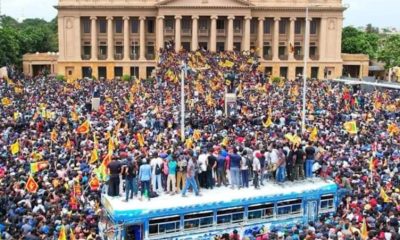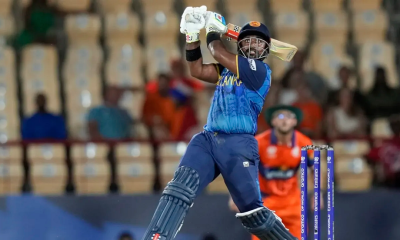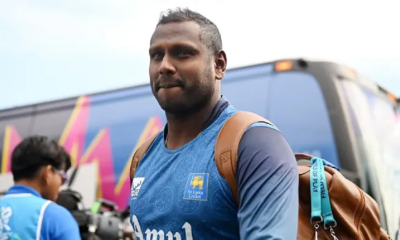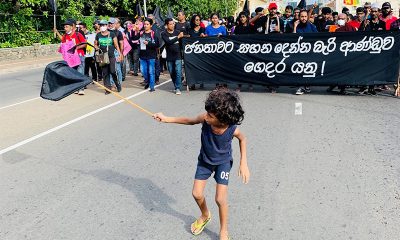Editorial
Aragalaya through political lenses

Friday 12th May, 2023
There is hardly anything that the ruling party politicians and their cronies hate more than last year’s anti-government protests, which brought them down a peg or two. Never do they miss an opportunity to demonise Aragalaya. Chief Government Whip and Minister Prasanna Ranatunga, speaking in Parliament, yesterday, demanded to know from Opposition Leader Sajith Premadasa why the SJB had not mentioned the fact that a suspected sexual predator currently in police custody had been involved in Aragalaya. One cannot but agree with Ranatunga that such facts should not be suppressed.
Minister Ranatunga, however, should be reminded that the UNP, which his party, the SLPP, has closed ranks with, began its 17-year rule in 1977 by giving a presidential pardon to a notorious rapist called Gonawala Sunil, who was serving a jail term for raping a schoolgirl. He became more powerful than even some Cabinet ministers in the J. R. Jayewardene government. Soththi Upali was another rapist cum contract killer who worked for the UNP. A Pradeshiya Sabha chairman, who was accused of raping scores of women and throwing parties to celebrate his sex crimes backed the Mahinda Rajapaksa government, and after the 2015 regime change, he switched his allegiance to the SLFP.
Aragalaya represented in microcosm the Sri Lankan society, and therefore there were all sorts of characters among those who converged on the Galle Face Green in support of it. But the government politicians and their propagandists will be mistaken if they think they can use the presence of such anti-social elements at the Galle Face protest site to dupe the public into believing that Aragalaya was a coming together of a bunch of undesirables.
It is only natural that Aragalaya is viewed through various lenses, and opinions thereon are as conflicting as those of the proverbial blind men who tried to figure out the shape of an elephant by feeling it. The protest movement, which came to be dubbed Aragalaya, we believe, went through three main phases, which should be examined separately. Initially, it was apolitical, creative and leaderless; after a couple of weeks it became politicised and aggressive, and finally it turned out to be violent and destructive.
Aragalaya , in our book, began as a spontaneous eruption of public emotions owing to unprecedented economic hardships, corruption, shortages of essentials, and above all, a widespread sense of despondency in the polity; it was a catharsis of sorts for the resentful public, especially politically-conscious young netizens, who mobilised themselves via social media. Initially, a large number of youthful protesters unleashed their creative energy by taking to the streets and made their struggle hugely attractive to the public. Aragalaya, at that stage, was apolitical, leaderless, and similar, in some respects, to the wall-panting spree thousands of youth embarked on, in the aftermath of the 2019 regime change, the major difference, however, being that the former was a sudden outburst of anti-government sentiments characterised by anger while the latter was an expression of hope.
A couple of weeks later, political parties gained control of the protest movement with the help of their activists, especially artistes, among the protesters. Various other organisations such as foreign-funded NGOs, religious groups, also used Aragalaya to advance their agendas; claims being made in some quarters that certain external forces backed the protest campaign cannot be dismissed out of hand. Only a thorough probe will help establish their veracity or otherwise. Ultra-radical political outfits with anarchical agendas hijacked Aragalaya after the goon attacks on protesters at Galle Face in May 2022, and the retaliatory violence that ensued, and turned it into a firenado of sorts, and the interests of the genuine protesters fell by the wayside.
Ironically, it is at the hands of the biggest beneficiary of the Galle Face protest movement that Aragalaya suffered a decapitating blow. After being appointed the Acting President, Ranil Wickremesinghe, who would never have been able to achieve his presidential dream if not for Aragalaya, ordered a crackdown on a mob that tried to march on Parliament. But for his decisive action, the country would have been plunged into anarchy. He went on to have the Galle Face Green cleared of protesters and ban political events on the oceanic park, which was the cradle Aragalaya.
It may be easier to demonise Aragalaya than to tackle the causes thereof, but such action will not help prevent mass uprisings in the future. Instead of lumping all Aragalaya protesters together and vilifying them, the government politicians ought to turn the searchlight inwards, engage in constructive self-criticism, and figure out what went wrong and make a course correction; ideally, they should step down, allowing the people to elect a new government.
Editorial
Corruption and comeuppance

Wednesday 30th April, 2025
Two erstwhile strange bedfellows—the UNP and the JVP—are at each other’s jugular. Following the 2015 regime change, they embarked on the UNP-led Yahapalana government’s anti-corruption crusade. Their political honeymoon lasted for nearly five years.
Hardly a day passes without President Anura Kumara Dissanayake, who is also the JVP/NPP leader, taking a swipe at UNP leader and former President Ranil Wickremesinghe, and vice versa. After making a statement to the Commission to Investigate Allegations of Bribery or Corruption (CIABOC), on Monday, over what he had said in defence of former Chief Minister (CM) Chamara Sampath Dassanayake, who is being held on remand for alleged financial malpractices, Wickremesinghe tore into the JVP-led government for having targeted him unfairly. He went on to allege that the CIABOC had leaked information about its correspondence with him to President Dissanayake.
Wickremesinghe’s sharp rebuke of the CIABOC and the JVP/NPP can be considered as an instance of karmic forces in action. When Wickremesinghe was the Prime Minister (from 2015 to 2019), he and his JVP chums including Anura Kumara ran the Yahapalana government’s Anti-Corruption Secretariat, and came under criticism for launching political witch-hunts against their political rivals.
Current Minister of Public Security Ananda Wijepala functioned as the head of the Anti-Corruption Secretariat. Hundreds of files on various individuals found their way into the hands of the JVP leaders, who displayed them subsequently, claiming that a future JVP government would probe all of them. They have not fulfilled that pledge. PM Wickremesinghe could not have been unaware of the unauthorised removal of files from the Anti-Corruption Secretariat. Now, he is berating the CIABOC for leaking information to the JVP/NPP!
Wickremesinghe has been critical of the CIABOC’s selective efficiency, which however is not of recent origin. The national anti-graft commission has always taken action against Opposition politicians very efficiently, as it did during the Yahapalana government. The boot is now on the other foot!
One may recall that the Yahapalana era was characterised by show arrests, as it were, and some courts were kept open until midnight for the suspects who were taken there from the CID headquarters to be remanded. However, such measures did not help bring the corrupt to justice. Maithripala Sirisena, who won the presidency in 2015, with the help of the UNP, the JVP, etc., promising to throw the Rajapaksas behind bars for corruption, joined forces with them in late 2018 for expediency, and Wickremesinghe did likewise four years later.
Interestingly, the alleged financial malpractices for which ex-CM Dassanayake has been remanded occurred during the Yahapalana government, while the JVP was running the Anti-Corruption Secretariat for all practical purposes. There were complaints against Dassanayake. Why he was not arrested at that time is the question.
The JVP/NPP has condemned Wickremesinghe for defending the corrupt. Ironically, the JVP had no qualms about defending Wickremesinghe and his UNF government although he openly shielded the perpetrators of the Treasury bond scams. The JVP was also instrumental in defeating President Sirisena’s efforts to sack theYahapalana government and dissolve Parliament in late 2018; it enabled Wickremesinghe to retain the premiership. It did so in spite of serious allegations of corruption against the UNP and Wickremesinghe. The UNP-led dysfunctional government, propped up by the JVP in Parliament, neglected national security and failed to prevent the Easter Sunday attacks (2019).
What Wickremesinghe is experiencing at the hands of the JVP can be considered his comeuppance. After securing the presidency with the help of the SLPP in 2022, he unflinchingly threw his weight behind the then Minister Keheliya Rambukwella, who was accused of procurement rackets in the Health Ministry. He also defended Sri Lanka Cricket officials despite damning allegations against them, and incurred much public opprobrium, which found expression in a massive protest vote, which benefited the JVP-led NPP in last year’s elections.
Meanwhile, it will be interesting to know from President Dissanayake how his government intends to deal with corruption in the cricket administration, which is the Sri Lankan version of the Augean Stables.
Editorial
Specious arguments

Tuesday 29th April, 2025
The government and the Opposition are engaged in a no-holds-barred battle to win the upcoming local government (LG) elections. Their election campaigns have turned down and dirty, and the polity is red in tooth and claw, with vilification campaigns being carried out against not only politicians but also their kith and kin.
If the ruling NPP fails to retain its votes at the current level next month, the Opposition will claim to have made a breakthrough in its battle against the government. This is something the NPP needs like a hole in the head. If the Opposition parties, especially the SJB, the SLPP and the UNP-led NDF, fail to recover lost ground and improve their electoral performance significantly, they will have to face a long haul in the political wilderness. So, it is only natural that both the NPP and the Opposition are doing everything in their power to shape and sway public opinion in their favour.
Some NPP MPs have put forth an absurd argument; they say that since their party has won both presidential and parliamentary elections, the local councils, too, should be placed under its control if the people are to benefit. If the public is convinced that the NPP is better than its predecessors and can be trusted with the administration of the local councils as well, they may vote for the NPP, but they must not do so simply because the NPP has won the executive presidency and is controlling Parliament.
A democracy worthy of the name should be able to function properly in situations where the three tiers of government are controlled by different political parties. The Colombo Municipal Council remained under UNP control for decades during SLFP/SLPP governments. The JVP bagged the Tissamaharama Pradeshiya Sabha in 2002 while Chandrika Bandaranaike Kumaratunga, who led the People’s Alliance (PA), was the President, and the UNP led by Prime Minister Ranil Wickremesinghe was controlling Parliament. It won six seats as opposed to the PA’s two and the UNP’s four. The JVP, which leads the NPP, is now using the exact opposite of the argument it touted in 2002 to persuade the people of Tissamaharama to vote for it!
There is an incomprehensible practice of handing over the reins of Parliament to the party that wins a presidential election, and this makes one wonder whether there is any point in holding separate parliamentary elections. A popular mandate given to the Executive President does not cancel that of the party controlling Parliament.
The SLPP, the SLFP and the UNP have set a very bad precedent. Last year, the SLPP government stepped down, allowing the NPP to secure control of Parliament after Anura Kumara Dissanayake’s victory in the presidential race. In 2015, the SLFP-led UPFA gave up control of Parliament, upon the election of Maithripala Sirisena as President, enabling the UNP-led UNF to form a government. The UNF government did likewise in 2019, when Gotabaya Rajapaksa was elected President. The SLPP controlled Parliament, without a mandate, from Nov. 2019 to August 2020. In 2015, within a few weeks of forming a government without a popular mandate, the UNF facilitated the first Treasury bond scam.
The Executive Presidents do not resign when their parties lose general elections. Haven’t those who vehemently oppose the Executive’s interference in the legislature themselves subjugated the ‘independence of Parliament’ to the will of the President?
There is also another flawed argument that the people should strengthen the hands of President Dissanayake to govern the country better by bringing the LG authorities under NPP control and thereby enabling him to have his policies and programmes implemented effectively at the grassroots level. President Dissanayake has been controlling not only the LG bodies but also the Provincial Councils through the Governors appointed by him, the way Presidents Gotabaya Rajapaksa and Ranil Wickremesinghe did. The Special Commissioners who are currently in charge of the local councils report to the Governors and therefore they are at the beck and call of the President.
It is hoped that the public will not be swayed by preposterously specious arguments that are being touted by the government and the Opposition.
Editorial
Of that colourless evil

Monday 28th April, 2025
The truth becomes the first casualty of any propaganda campaign, especially in Sri Lankan politics, which exemplifies the Macbethian paradox—fair is foul, and foul is fair; politicians of all hues have mastered the art of stretching the truth to the breaking point ahead of elections and duping the public.
The truth is distorted or exaggerated in such a way during election campaigns that it becomes hardly distinguishable from an outright lie in most cases, as evident from claims and counterclaims at the ongoing propaganda rallies, where mistruths, half-truths, lies and about-turns have become the order of the day. Interestingly, some self-righteous candidates and their leaders are accusing their political rivals of uttering lies, while they themselves are lying their way through, so much so that one is justified in saying, “Lies, damned lies, and campaign rhetoric.”
There has been a real hullabaloo over a statement made by President Anura Kumara Dissanayake at an NPP election rally recently. He said something in Sinhala to the effect that the government would readily allocate state funds to the local councils to be won by the NPP, as he could vouch for the integrity of only the candidates of his own party, and where other councils were concerned, the government would have to exercise stringent oversight in reviewing requests for funds to guard against malpractices in a manner that might lead to delays.
The Opposition has amplified the subliminal message in the President’s statement, making a hue and cry over it. Its speakers thunder from political platforms, claiming that the President has threatened to stop state funds to the councils to be won by the parties other than the NPP. They have gone so far as to lodge a complaint with the Election Commission against the President and the NPP, and declared that they are capable of running local government authorities under their own steam without seeking funds from the government!
When the presidential statement at issue, which borders on a warning, is viewed under the microscope, a veiled threat becomes discernible in its subtext; however, the President and the government could have defended it effectively on the grounds of their accountability for ensuring financial probity in local councils. They should have quoted the President’s statement in question verbatim in support of their argument. But President Dissanayake has since changed his position in a bid to obfuscate the issue, claiming that he said he will not allow corrupt politicians to steal state funds and therefore local government bodies reeking of corruption will not get any tax money, which has to be frugally managed. He has, true to form, taken the moral high ground.
The Opposition has failed to point out that the government is relying on individual politicians and not systems as such to battle corruption in local councils, and the President’s statement at issue is tainted with petitio principii or circular reasoning; the President has assumed that only NPP candidates are honest and used that assumption to support his argument that the councils under their control will be free from corruption and therefore qualified to receive state funds.
There are already systems in place to tackle bribery and corruption in state institutions, and if they are used to deal with the people’s representatives and officials indulging in corruption, local councils will be free from corruption regardless of the political parties controlling them. There is a need for stronger legal and enforcement mechanisms, and it is up to the government to introduce them, as a national priority. Those who seek approval for building plans, etc., are at the mercy of local council heads and officials, who cause unnecessary delays so as to have their palms greased. The public should be able to report such instances to a higher authority and obtain relief reasonably fast.
Corruption is colourless, to begin with; it is neither green nor blue nor red nor maroon. It transcends party lines and ideological affiliations. Hence the need for Sri Lanka to battle the colourless evil by putting in place robust mechanisms and ensuring the strict enforcement of anti-corruption laws to achieve that noble end.
-

 Business4 days ago
Business4 days agoPick My Pet wins Best Pet Boarding and Grooming Facilitator award
-

 News4 days ago
News4 days agoNew Lankan HC to Australia assumes duties
-

 News4 days ago
News4 days agoLankan ‘snow-white’ monkeys become a magnet for tourists
-

 News2 days ago
News2 days agoJapan-funded anti-corruption project launched again
-

 Features4 days ago
Features4 days agoKing Donald and the executive presidency
-

 Business4 days ago
Business4 days agoACHE Honoured as best institute for American-standard education
-

 Features6 days ago
Features6 days agoThe Truth will set us free – I
-

 Business2 days ago
Business2 days agoNational Savings Bank appoints Ajith Akmeemana,Chief Financial Officer
























